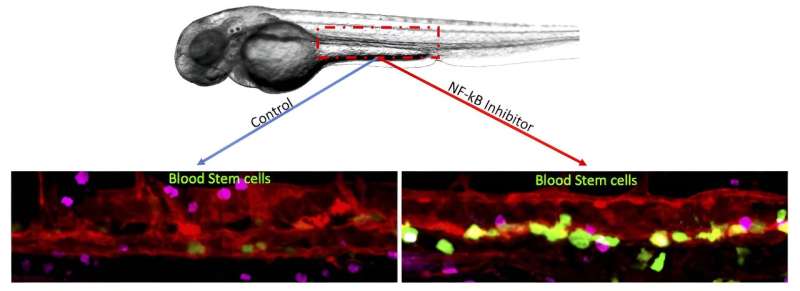This article has been reviewed according to Science X's editorial process and policies. Editors have highlighted the following attributes while ensuring the content's credibility:
fact-checked
peer-reviewed publication
trusted source
proofread
Pausing biological clock could give boost to lab-produced blood stem cells

A decade ago, Raquel Espin Palazon discovered that inflammatory signaling pathways must switch on for embryos to produce blood stem cells. The latest work from her lab shows the potential value of keeping those same signals switched off after their initial activation.
The new research from a team led by Espin Palazon and Clyde Campbell, assistant professors of genetics, development and cell biology at Iowa State University, will benefit efforts to develop lab-grown, patient-derived blood stem cells. The promising but work-in-progress advancement in regenerative medicine could eliminate the need for bone marrow transplants to treat blood disorders such as leukemia, lymphoma and anemia with stem cell injections.
Timing is the key to the findings, published Sept. 6 in Nature Communications. Espin Palazon's earlier work established that NF-kB—a well-studied network of proteins that helps trigger inflammation, the host of reactions our bodies use to fight infections, injuries and other perceived dangers—was essential as blood stem cells form. Understanding when and why inflammatory signals appear will help replicate the process.
"This was really a huge step forward for the lab-based production of blood stem cells. Those protocols are going to be more precise and efficient," Espin Palazon said.
Signals come in waves
Stem cells are how organisms grow, repair and renew, the source of every new cell. Some stem cells can create any type of cell, while others are specialized. The hundreds of billions of new blood cells a human makes every day come from specialized hematopoietic stem cells in our bone marrow. A lifetime supply of hematopoietic stem cells is created before birth inside an embryo.
Espin Palazon and Campbell's research group works on zebrafish, a common subject in medical research because they are genetically similar to humans and lay fast-developing eggs outside their bodies. By inserting fluorescence-producing reporter genes, scientists can make selected types of protein and gene expression visibly glow.
Tracking real-time NF-kB expression in zebrafish embryos with a reporter line that only lights up briefly, the Iowa State-led team found that inflammatory signaling activates in two waves. Switching on and off twice acts as a biological clock, coordinating a progression that converts some of an embryo's vascular cells into blood stem cells.
If the first wave doesn't arrive, cells aren't primed for the transition. If the second wave doesn't arrive, newly created stem cells don't detach from blood vessels and rush off into service. In between the waves, blood stem cells are born and proliferate modestly. But if the second wave is delayed, they keep proliferating, researchers found.
"By manipulating that signaling, we can create a massive amount of blood stem cells," Espin Palazon said.
'I nearly fell out of my chair'
Researchers had no inclination that inhibiting the reactivation phase could rev up blood stem cell production, Campbell said.
"I was the first person to see it through the microscope, and I nearly fell out of my chair. I yelled at Raquel, 'What is this?' It's one of those moments you love to have in science. There are just a few times when you see something that blows you away. I expected to see maybe eight stem cells, and instead I saw hundreds," Campbell said.
Finding a way to potentially amplify the yield is intriguing because the existing methods for culturing blood stem cells produce few functional cells, Espin Palazon said. The process involves genetically reprogramming mature cells to behave like the make-anything stem cells abundant in embryos, then using those induced pluripotent stem cells to generate blood stem cells. Further study is needed to figure out how deeper insight into inflammatory signal timing can be used to improve the protocols for creating blood stem cells in a lab.
"Now, it's all about optimization and integration of these signals," Campbell said.
What's next
For years, Espin Palazon and Campbell have collaborated with researchers at the Children's Hospital of Philadelphia, which does extensive work on induced pluripotent stem cells. Researchers there confirmed the NF-kB signaling has similar timing patterns and effects in lab efforts to produce human blood stem cells.
While they will continue to collaborate with the hospital, the ISU researchers will soon be able to study the process in-house, in a new cell culture lab on Iowa State's campus capable of generating induced pluripotent stem cells. Campbell, who spent a month learning the protocols at the Philadelphia hospital, said the lab should be up and running by the end of the year.
Espin Palazon and Campbell said they expect the methods and findings from their latest work will translate to the study of other types of stem cells, the aging process and patient-derived immunotherapy to treat cancer. Scientists continue to learn more about the varying functions of inflammation signaling throughout life.
"Inflammatory networks are required to start life, they keep us alive by fighting infections and viruses and, in the end, can cause our demise," Campbell said.
More information: Clyde A. Campbell et al, p65 signaling dynamics drive the developmental progression of hematopoietic stem and progenitor cells through cell cycle regulation, Nature Communications (2024). DOI: 10.1038/s41467-024-51922-5
Journal information: Nature Communications
Provided by Iowa State University



















